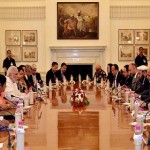The crucial difference between President Ashraf Ghani and his predecessor Hamid Karzai and other Afghan leaders lies in their world views, which determine their foreign and domestic policy choices. Ghani is a proud Afghan like the other leaders, but he is an intellectual child of the West, notwithstanding his warm references to Tagore; the others were leaders of the Afghan jihad and had studied in the academic institutions of the East.
It is not surprising therefore that Ghani was preferred by the West as Karzai’s successor. It is also not surprising that he brings a vastly different style than that of Karzai, but also accords a different priority to India. Karzai, after a brief initial flirtation with Pakistan, realised that India had a crucial role to play in the security sector in Afghanistan. It is another matter that the UPA government’s response was cold and tardy.
What is India’s position in Ghani’s scheme of things? This requires a full examination, for Ghani has tried to project a different view on India on the eve of his visit and while he has been in Delhi from the views he took in the past.
In his inaugural address on 29 September 2014, Ghani defined five circles for the conduct of Afghanistan’s foreign policy. The first circle was Afghanistan’s neighbouring countries; the second was the Islamic world; the third comprised the U.S., Canada, Japan, and the European countries; the fourth was Asia; and the fifth was international organisations.
If the first circle was fuzzy it became clear in Ghani’s speech, a month later in Beijing, when he said that the first circle consisted of Afghanistan’s neighbours and unequivocally stated that China shared a border and hence, by implication, was in that circle. The only inference that could be drawn from Ghani’s circles doctrine was that India was in the fourth circle. The relegation of India’s importance was also borne out by Ghani’s travels and a segmented approach towards India when he made it obvious that he did not want India to have a role in the country’s security sector except by way of training. He gave priority to his visits to China and Pakistan, and it has taken him seven months to visit Delhi.
In an interview to an Indian TV journalist prior to his India visit, Ghani repudiated the charge that India was not significant for him. He said that India was in four of the five circles of Afghan foreign policy. The same point is mentioned in the India-Afghanistan Joint Statement: “President Ashraf Ghani reiterated Afghanistan’s perspective on the foundational nature of Afghanistan’s ties with India, and the fact that India figured in four of the five Afghanistan’s foreign policy priorities”. However, Ghani’s reasons for these assertions are revealing.
The first circle defined precisely as neighbours for China’s inclusion has been expanded to the neighbourhood stretching from India to Azerbaijan to include India. As Ghani has transited from neighbouring countries to neighbours to neighbourhood it seems that the last formulation is a product of convenience and not an evolution in his thinking. This is abundantly clear from his responses in India. Ghani has made India “the second largest Muslim country on earth” to put it in the second circle. Perhaps Ghani implies that India has the world’s largest second largest Muslim population but that does not make it a Muslim country. Certainly no Indian government can accept inclusion in Ghani’s second circle. In his faltering, Ghani, a distinguished scholar renowned for his linguistic skills reveals his real objective—to romance India during the visit so that the low priority he really gives India can be overlooked.
It is clear from Modi’s and Ghani’s statements at the joint media briefing that while the former dwelt on specifics the latter spoke in generalities. Modi, while emphasising connectivity, expressed a willingness to join the successor to the Afghan-Pakistan Trade and Transit Agreement. Ghani responded by outlining an impressive vision of regional connectivity and of Afghanistan’s crucial place in it. He also spoke of Afghan transport reaching Wagah-Attari, but was silent on Indian goods going via Pakistan to Afghanistan from those points. Modi spoke about India’s role in Afghan security personnel and in the principles that need to the basis of reconciliation with the Taliban. Ghani did not respond to either point.
The Afghan people may be getting impatient with Pakistan’s unwillingness to rein in the Taliban, make them give up violence, and force them to the negotiating table. However, Ghani, even while stressing that Pakistani commitments have to be judged by actions on the ground is unwilling to dilute his diplomatic and political investments in the goodwill of the Pakistani generals. Only this can explain the lengths he has gone to during his India visit to ensure that he utters no word that can raise an eyebrow in Rawalpindi.
Ghani wants Indian aid to flow in. He is keen to get Indian businesses to invest in a big way in the country’s mineral sector. However he wishes to play to Pakistan by adopting a segmented approach and keeping India out of the security sector of Afghanistan. He must appreciate that India has security interests in the entire region and these have to be safeguarded. This may be old-fashioned thinking in Ghani’s view but it is the eternal truth of interstate relations.
Vivek Katju has served as India’s Ambassador to Afghanistan, Myanmar and Thailand. He was one of India’s chief negotiators during the hijack of Indian Airlines flight 814 in 1999 at Kandahar in Afghanistan, when he headed the Pakistan-Afghanistan-Iran desk at the MEA.
This article was exclusively written for Gateway House: Indian Council on Global Relations. You can read more exclusive content here.
For interview requests with the author, or for permission to republish, please contact outreach@gatewayhouse.in.
© Copyright 2015 Gateway House: Indian Council on Global Relations. All rights reserved. Any unauthorized copying or reproduction is strictly prohibited


